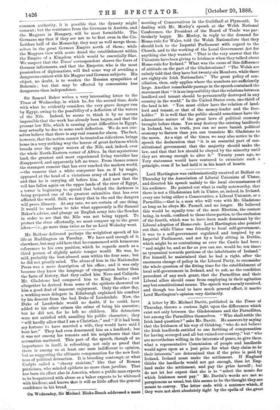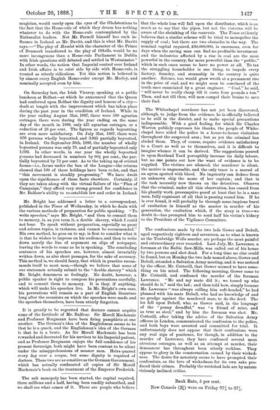A letter by Mr. Michael Davitt, published in the Times
of Thursday, throws a curious light upon the differences which exist not only between the Gladstonians and the Parnellites, but among the Parnellites themselves. "Who shall settle the Irish land question?" asks Mr. Davitt. He-answers by saying that the Irishmen of his way of thinking, "who do not believe the Irish landlords entitled to one farthing of compensation for having scourged and all but ruined our country," but "who are nevertheless willing, hi the interests of peace, to give them what a representative Commission of people and landlords would agree upon as a just price for what they claim to be their interests," are determined that if the price is paid by Ireland, Ireland must make the settlement. If England thinks the landlords wcrald not get enough, then let Eng- land make the settlement, and pay the price herself ; but do not let her expect that she is to "select the music for which Irishmen must pay." Mr. Davitt's words are not so perspicuous as usual, but this seems to be the thought they are meant to convey. The letter ends with a sentence which, if they were not shut absolutely tight by the spells of the great
magician, would surely open the eyes of the Gladstonians to the fact that the Home-rule of which they dream has nothing whatever to do with the Home-rule contemplated by the Nationalist leaders. Not Mr. Parnell himself has such in- fluence in Ireland as Mr. Devitt, and this is what Mr. Devitt says :—" The play of Hamlet with the character of the Prince of Denmark transferred to the play of Othello, would be no more incongruous than a Home-rule Parliament in Dublin with Irish questions still debated and settled in Westminster." In other words, the notion that Imperial control over Ireland and Irish affairs is to exist side by side with Home-rule, is treated as utterly ridiculous. Yet this notion is believed in by almost every English Home-ruler except Mr. Morley, and nominally accepted even by him.



































 Previous page
Previous page